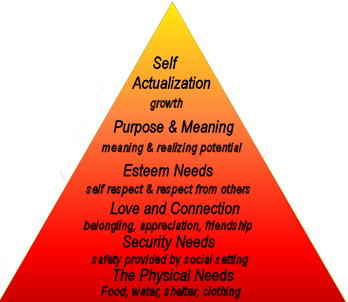Needs, Wants or Desires
Taking responsibility for our feelings
Needs
With observations and emotions I started out with dictionary definitions. With needs the definition in Nonviolent Communication is different
enough from the standard dictionary definition that I think it is better to just give the
NVC usage of needs. Needs are universal to all humans. Marshall says there are basically
seven needs; Connection, Physical Well-Being, Honesty, Play, Peace, Autonomy, Meaning. The other words on the NVC need list are variations of the basic seven.
Why do we need more than seven? If you are talking to a toddler about how your no
does not meet his need for autonomy and he doesn't understand, you might want
to use a different word he might understand instead of autonomy. Needs are
not specific to time, place or person. Saying, "I need you to clean your room," does not fit the NVC model for use of the word need.
The table below is from the Center for Nonviolent Communication list of needs. As you look at the words notice how the needs are always a positive energy. With emotions you can have positive (needs met) or negative (needs unmet) emotions. One of my NVC friends objected to my use of the word negative, because it infers wrongness or badness. For me I like negative because it tells me there is something wrong (usually my thinking) and if I identify the need I am in the solution phase. Focusing on the problem feels bad, focusing on the solution feels good.
CONNECTION
acceptance
affection
appreciation
belonging
cooperation
communication
closeness
community
companionship
compassion
consideration
consistency
empathy
inclusion
intimacy
love
mutuality
nurturing
respect/self-respect
CONNECTION continued
safety
security
stability
support
to know and be known
to see and be seen
to understand and
be understood
trust
warmth
PHYSICAL WELL-BEING
air
food
movement/exercise
rest/sleep
sexual expression
safety
shelter
touch
water
HONESTY
authenticity
integrity
presence
PLAY
joy
humor
PEACE
beauty
communion
ease
equality
harmony
inspiration
order
AUTONOMY
choice
freedom
independence
space
spontaneity
MEANING
awareness
celebration of life
challenge
clarity
competence
consciousness
contribution
creativity
discovery
efficacy
effectiveness
growth
hope
learning
mourning
participation
purpose
self-expression
stimulation
to matter
understanding
What is important about identifying needs? When we are in the need energy, being aware of our needs, it feels better. I am guessing that looking
over the list of needs feels good. If you can identify something that is bothering you, drivers or mothers usually get emotions going in my classes
when someone says I don't get upset about much.
If you can identify the need that is causing the upset you will notice a calming affect.
This is an important component of empathy.
One thing that is emphasized in NVC is knowing the difference between needs and strategies
for meeting needs. Needs are typically one word and universal to all humans. Strategies involve the actions to meet the needs. I have a need for order
is a clear expression of a need. I need you to pick up after yourself
is an expression of a strategy. A specific person taking some action. When
we are giving someone empathy it is important to stick with needs and not strategies or advice until they are fully heard. And then only go to strategies
and advice when asked. Sticking to needs is a real challenge for most people, we have been trained by society to fix things. People don't like "being fixed."
It implies there is something wrong with them.
Keys to Taking Responsibility for Emotions. (Expressing Needs Clearly)
1. Distinguishing between needs and strategies.
Expression of a Strategy
Expression of a Need
- I need you to show me some respect.
- I have a need for you to help.
- I want my son to listen.
- I would like some respect.
- I need support.
- I am needing to be heard.
2. Taking responsibility for our feelings.
Denial of responsibility
Accepting responsibility
- You make me mad when you don't show respect.
- I feel glad that you got the promotion.
- I feel sad when you don't understand me.
- I feel annoyed when you don't address me as Sir, because I am wanting respect.
- When you got the promotion I was glad because I was hoping you would be recognized for all that you had done.
- When you look at me like that, I feel disappointment and I am guessing you are not getting what I am saying. Need: to be understood.
3. Using emotions to help identify needs.
Emotions/feelings
Needs guesses
- I feel he'll never finish his project. (concern)
- I feel inadequate as a parent.(shame)
- I feel rejected. (lonely)
- efficiency, competence, awareness, effectiveness, purpose, compassion
- appreciation, acceptance, empathy, competence, understanding
- closeness, acceptance, love, belonging, companionship, trust, harmony
| Needs Expressed in a Disconnecting Way | Needs Expressed Clearly |
| I feel I should be more organized | Show: |
| You are not listening. | Show: |
| I feel intimidated | Show: |
| I feel you should do the dishes like you promised. | Show: |
| I feel like you seldom pick up after yourself. | Show: |
Where to go from here? Test your ability to recognize clear expressions of needs with the needs challenge. After needs, the next component is Requests.




